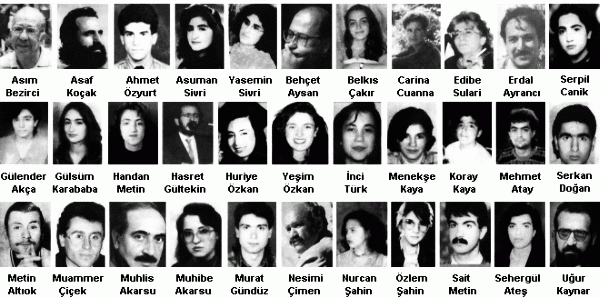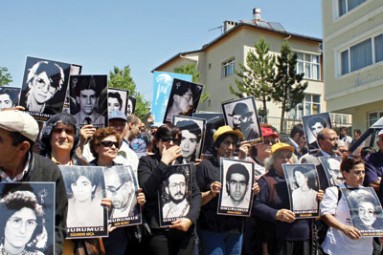Dostun bahçesine bir hoyrat girmi?
Korudur hey benli dilber korudur
Gülünü dererken dal?n? k?rm??
Kurudur hey benli dilber kurudur
To the garden of my love there came an evil louder
The shrubs now lie there, my beautiful one, shrubs lie
While gathering the roses, he broke their stems to moulder
They are all dry, my fair one, they are all dry.
—Pir Sultan Abdal, 'To the Garden of My Love There Came an Evil Louder'
Since the worst prison fire in a century in which up to 375 Honduran inmates suffocated and burned alive in their cells, some have brought news of another fire-induced slaying to my attention. Its consequences are reverberating in Turkish civic life this week. On 13 March 2012, an Ankara court is expected to close the case of the 1993 Sivas mass burning, in which plaintiffs say some suspects are still at large, due to a statute of limitations.
Sivas is known as the home of minority Alevis, a religious group known for its syncretic or 'heterodox' Islamic practice. The Sivas Massacre, as it is known, saw the killing of 35 writers, intellectuals, poets, artists, tourists, and hotel staff (plus two suspected arsonists) by a group of 'Islamist' Sunni vigilantes—known for viewing the Alevis with disdain—who set fire to the Mad?mak Hotel. Celebrants (most of them Alevis) had gathered for the Alevite Festival on 2 July 1993 in honor of the sixteenth century Alevi poet Pir Sultan Abdal. The victims were killed when the hotel in Sivas was torched by a large, angry group heard screaming 'down with secularism,' among other chants. They also shouted the name of writer Aziz Nesin, who was believed to have been targeted for facilitating the Turkish translation of Salman Rushdie's The Satanic Verses.
Witness testimony and videotape evidence showed that police 'merely gazed at the scene with empty looks' as the building was set on fire (in the aftermath of the Comayagua prison fire, a narrative of neglect and tacit police encouragement has also been confirmed). Cemal ?ahin, the uncle of victims Nurcan and Özlem ?ahin, said an incredible sense of helplessness overtook those who watched the events on live television with little hope besides the intervention of state forces, to no avail. According to ?ehriban Metin, who lost her 20-year old sister Handan Metin’i in the fire, relatives and attorneys for the deceased were continually mistreated—sworn at, pushed and shoved—by the police. No member of the police force or the military was held responsible for not interfering.
Thirty-three people were tried and convicted of 'attempting to destroy constitutional order' and given death penalties, which were converted to life sentences when Turkey abolished the death penalty in 2002. Fifteen years later an Ankara prosecutor demanded that the case be dropped, since it had been filed on the charge of attempting to destroy constitutional order, which carries a 15-year statute of limitation. Although 79 people have been sentenced to to prison terms so far, six suspects in the case are believed to be still missing. Critics of the Turkish government say it has failed to bring any figures of law enforcement to justice and that it has shielded missing perpetrators from facing the full brunt of the law in the past 18 years.
The Collective Memory Platform on the expiration date in the Sivas case:
Plaintiff lawyer ?enal Sar?han had previously told Bianet that the defendants were litigated under Article 146/3 of the Turkish Criminal Law (Subversion). Even though they might benefit from the statute of limitation according to domestic law, international law had to be considered since the offences lay within the scope of 'crimes against humanity.'
Sar?han reminded the court that the six defendants alleged to be fugitives had gotten married in the meantime, had children and registered them at school. She added that it was incomprehensible that these people had not been arrested until today.
'If the case ends on March 13, we will appeal to a higher court, and if we cannot get a result again, this case will go to the ECHR [European Court of Human Rights] in the end,' Sar?han told the Daily News.
For its part, the Erdo?an government unanimously blocked the draft bill on 6 March 2012, which would have brought the issue before the Turkish Parliament. The bill was introduced by the CHP or Republican People's Party, the main Turkish opposition group, and was intended to abolish the same statute of limitations that will prevent defendants in the case from being tried. During the last two years of the trial, the related bill (to recognize the massacre as a crime against humanity) was blocked 17 times, in addition to the last time when it was blocked, in its 'draft' state.
Plaintiffs want the case to be treated as a breach of human rights under international law, blaming the Turkish politico-juridical process for leaving them bereft of meaningful closure. Their alienation from the system—despite sentences already handed down to those found guilty—would not be without merit. The Turkish Human Rights Foundation has reported on numerous 'unsolved' extra-judicial killings, often at the hands of the police and gendarmerie. Amnesty International blogger Howard Eissenstat says the 'ghosts of Sivas' is an echo of past crimes, in the context of Turkey's Article 301 statute which criminalizes 'denigrating Turkishness.' And let us say nothing of systemic racism and intolerance toward Kurds, Armenians, and Shiite Muslims.
_______
In the middle of preparing this post I was interrupted by news of a deadly mosque arson in Belgium, where a man was seen throwing Molotov cocktails—Molotov cocktails—at a Shiite mosque, killing its 47-year old imam. The mosque is said to be entirely burned down.
The newspaper Le Soir reported that a man entered the Shiite mosque in Anderlecht, a suburb of Brussels, shortly before 7pm local time armed with an axe, Molotov cocktails and a can of gasoline. The newspaper reported that the man broke windows, then threw the incendiary devices inside.
It is said that the imam died trying to put out the fire.

